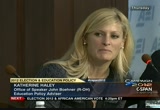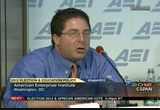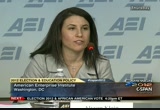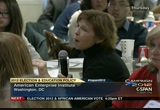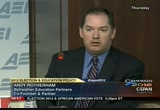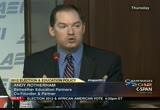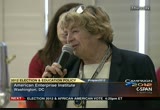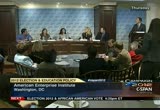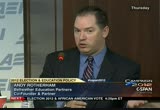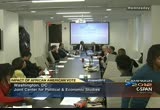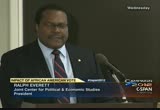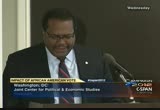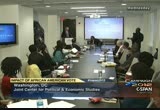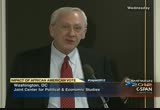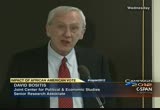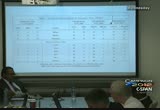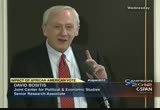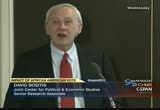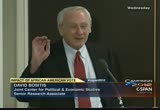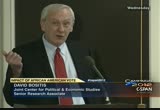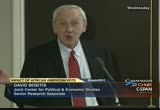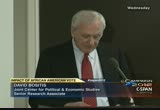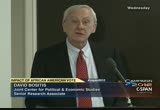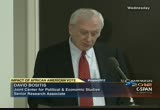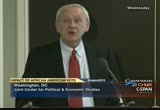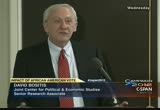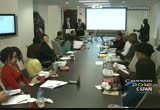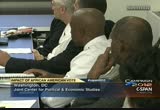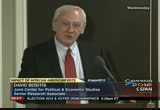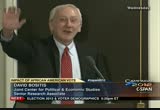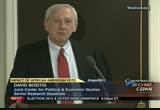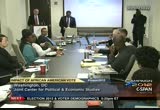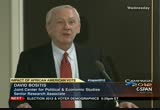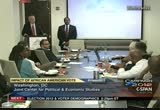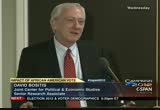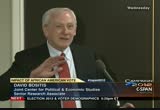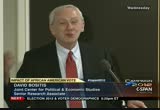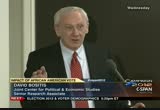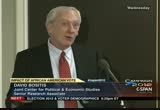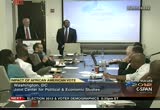tv African- American Voter Impact CSPAN November 10, 2012 4:10pm-5:05pm EST
4:10 pm
when up 46 date, adopting them in order to be competitive -- we have 46 states, adopting them in order to be competitive is an interesting carrot. >> >we have about over 10 minutes. i want to make sure we get some time for questions and answer. let's start all the way in the back. >> i am with the international society for technology and education. the assessments are scheduled to be implemented in 2014. school districts will need to of grand broadband, make sure their kids can be successful.
4:11 pm
do you think that is enough of a pressure point? >> in idaho, and the voters voted to strike down the digital learning piece of the reform package to das2-1. it is a sign that the folks that are pushing for digital learning have a lot of work to do in terms of getting the public on board. >> i would say a regular survey of the policy elite in washington published its. we have questions about this. there is a big concern about the ability of them to meet the challenges that have been laid out for them. there are concerns about technology. you said it is a pressure point. i think it is potentially a
4:12 pm
friction point. you're going to see more of that. i think states can use this as more opportunity to back out. >> in terms of more federal money, people said to us live all been talking about how there is a big squeeze. and 11 people feel like the money the department provided was not enough. there needs to be more resources. i do not see it happening. >> let's go right here. >> your discussion on the fiscal cliff is the conventional wisdom. they will find a way to build
4:13 pm
the bridge. i was the discussion yesterday where an alternative was presented. these numbers were saying that the fiscal cliff offers members of congress very difficult choices. nobody wants to vote for cuts to programs and entitlements and increasing taxes. there is a growing group that just my support growing over. they have the opportunity to do some positive things for their constituents who are injured in the fall. i'm curious if that makes any sense to you? >> begins to be january 1, 2013. rates are reset to where they were before the tax cuts. the amt reminas.
4:14 pm
all they suddenly have a lot of revenue. you can spend money. thee you get there, and t president has made it clear that the rights expire, cut elsewhere. that will actually come he will try to back down. he put them in a squeeze for the year either for keeping up tax rates for the folks outside of the top rate racket sport not. he could absolutely play that game. it is clear that any of this talk of finding a chemical bipartisan solutions is going to be shot. if they're going to play it that way, there will be winners and losers.
4:15 pm
sequestration will start for other step that does not have the flexibility that others do. it will be a really harsh two years the next midterm. >> you'll never grow broke in this town betting on cynicism. everyone who has been in government knows you're always accused of these very electrified part conspiracy mousetrap schemes. it is not work like that. it is not that nobody wants to cut entitlements are raise taxes. one group wants to cut it. one groups want to raise taxes and one wants to cut spending. in general, members of congress are not any member of inflicting pain. i think it is more aegis have genuine disagreement that is very deep-seated.
4:16 pm
if you pledge that you're not going to raise taxes, it is hard for you to turn around and do so. you concerned you're going to give primarget primaried. the problem is not your words will boost a general election but that they will learn a primary care that is why the place is a broken right now. we still have not talked about that. this is why it is going to be really hard to get to a deal. john boehner has the toughest job in washington. he is the ringleader. it is a complete three ring circus. >> did you want to jump in net tathere? >> we have read similar articles. they're all kinds of ideas and
4:17 pm
theories out there. the position of the house is that we would like to resolve this before the end of the year. if you let sequestration takes of that, there are things that need to be done specifically with the war act. you have to know your employees are at risk for losing their jobs. that window has long since passed. the department of labour put memos out to significant employers. no need to notify your employees. if you are going to take that risk, there is a lot of things that need to have already been done. from the position of the house, our intent is to resolve the fiscal clip with respect to sequestration as well as taxes before the end of the year.
4:18 pm
>> let's take another couple of questions. >> >> and the congressional correspondent for the hispanic outlook on higher education. i am wondering what you thought this election may have. i cover a lot of immigration. the biggest ones that will at that this is not the dream act but the automatic green cards to foreign students. these are not going to be latinos. this is going to go to the
4:19 pm
education committee. >> it has a lot of bipartisan support. >> are you referring to the stem student visa? >> i think the house passed recently a bill that would expand the visas for its students seeking stem education. it is either in september or july. i am not sure. >> i do not think we have any type of particular insight. i think the answer is safely melt. i do not think the court decision is climb to be affected. >> >> thank you.
4:20 pm
i would be very interested in your prognostications about how the chess pieces are going to move for education policy. when a party heard that the team might go to treasury. d.c. any people are writing are leaving at the department and on hill we will haveol leadership that how do you think the chess pieces will move? -- leadership? how do you think the chess pieces will mode? >>% limited as the leader. senator alexander have different personalities. i would assume that there may be changes in the committee. other than that, i cannot speak
4:21 pm
to the others. >> i know what passes for cantor in washington. >> i presume that david is going to play a substantial role. if that is the case, there are many folks in this town that no that he has some skepticism about parts of the administration's agenda and how they have moved. i think that could make for some interesting conversations. it is pretty clear that secretary duncan would like the president to stay. it is safe to bet that martin is likely to stay in her key role. i think folks are very likely to want to go do something different. given that a lot of the second term may be driven out of the department, a cool wind of but those jobs is one to have a very
4:22 pm
substantial shake the hand lens. >> i would be hesitant to say what people are are not going to do. a campaign more money spent than ever. republicans control the house of representatives. democrats control the senate. president obama will be back in the oval office. personnel matters. the fundamental contours' have- nots change -- contours hav e not changed. personnel matters on some of the micro issues. i would pay more attention to the macro lessons. >> that is a terrific point to end up. thank you for our panelists for being here.
4:23 pm
thank you to all of you. [captioning performed by national captioning institute] [captions copyright national cable satellite corp. 2012] >> tomorrow on "washington journal" bill press looks of what is next for president obama's second term and the democratic party. michael steele discusses the future of the republican party. life 78 eastern on c-span.
4:24 pm
-- live at 7:00 a.m. eastern on c-span. >> this should be the year we stop our debt from a tax and entitlement reform. i am proposing that we avert the fiscal clips together in a manner that ensures that 2013 is finally the year that our government comes to grips with the major problems that are facing us. >> i am open to compromise. i am open to new ideas. ed to solving our fiscal issues. i'm not going to ask students and seniors and middle-class families to pay down the entire deficit while people like me are not as to pay a dime more in taxes. >> the current congress still has work to do.
4:25 pm
and planned cuts to domestic and military spending. follow all the floor debate starting tuesday at 2:00 p.m. eastern with white house coverage on c-span and the senate on c-span2. >> now i discussion on the impact of the african-american vote in the 2012 election including president obama's victory. this is just under one hour. >> good afternoon. i am president and ceo of the
4:26 pm
joint senses for political and economic study. this is one of the nation's leading public policy institutions. it is the only one that is focused primarily on issues of concern to african-american and other people of color. i want to welcome you here today to our assessment of the impact of impact of african- american vote in the 2012 election. all this was decisive, it was a close arrest in terms of popular vote and the fact that the margins or closed in quite a few of the critical battleground states. analysts will continue to look at and determine the results. i was struck last night by several things. the fact that the president was
4:27 pm
able to hold onto his boat totals from 2008, he would be hurt by the fact that the president was able to hold onto his vote totals from 2008 in a number of key battleground areas despite much speculation that he would be hurt by dampened enthusiasm among his 2008 supporters. second, by the rapid change in the demographics of some key states, particularly nevada and colorado and to some extent, virginia. not long ago, these were some of the rest of the red states, and we have watched through the election cycles of our population in these and other states shifting and changing and we see a number of significant changes in voting patterns. in 2008, president obama was swept into office with 97% of african-american votes and 43% of the white vote. today, we look forward to
4:28 pm
hearing from the senior research associate on his analysis on how these numbers faired in the 2012 elections and what it meant to the outcome we all watched last night and into the early morning hours. with that, let me call on the doctor for his analysis and remarks. that will be followed by questions from you. thank you very much. [applause] >> good afternoon. good afternoon. the 2012 elections are over and the elections were historic. there is one particular aspect of the elections that was historic that i would like to talk about first. it is not simply the reelection
4:29 pm
of the first african-american president. 2012 will be the last campaign where one of the major parties seeks to get elected solely with the white vote. is this on? 2012 was a clear showing that the country is now a multi- racial, multi-as that country and for a successful political party or a particle movement, they are going to have to appeal to a much broader swath than simply non-hispanic white people. the first thing i want to point out -- 2004, when john kerry ran against george w. bush, the
4:30 pm
proportion of the electorate that was white, according to the exit polls, was 79%. 79 and everyone hundred voters were non-hispanic white. four years later, and in 2008, that number had declined to 74%. this year, that number declined to 72%. in the meantime, the african- american share of the vote over that time increased from 11 to 13. the hispanic share from six to 10. and the asian american share from one to three. we are experiencing serious demographic change. if you look at these different populations, the white population, the non-spec white population in the united states is a seat -- it aging. the median age is 42. that means half the white
4:31 pm
people in the united states are older than 42. the median age for the black population is 33. the median age for the hispanic population is 25. half the hispanic population in the united states right now is the younger than 25 years old. what does that mean? it would not mean anything if our politics and parties were not largely based upon race and class and ethnicity. right now, they are. the republican party and certainly their candidate this year, a former governor -- former gov. romney of massachusetts, pursued a strategy of only appealing to white votes, particularly white conservative votes. he was successful and so far as
4:32 pm
he defeated among white voters -- he defeated president obama, 59% to 39%. he had 20% more than president obama received. in past elections, that would have been catastrophic for a cabinet in the united states. but despite the fact that president obama only received 39% of the white vote, he won the election 50% to 40%. he is about -- he has about 2.75 million more votes than governor romney. how did african-americans do? there are two aspects of the african-american voters want to talk about. it's not like there was truly a national campaign in 2012. if you lived in a swing state, you saw politics was all
4:33 pm
consuming. that was all that life was about, the 2012 election. on the other hand, if you did not live in a swing state, you probably were not entirely aware there was an election going on at all. in terms of the black vote, want to point out a couple of things. before i point out be increase in the black vote, want to mention one thing about gender. a major aspect of this election was about appeals to women, the phraseology was i believe "the war on women." there were issues having to do with rape, abortion, contraception, that were major elements of the campaign. there was a gender gap, and the gender gap was essential in terms of the outcome of the
4:34 pm
election. but i want to mention there was a recurrence of the black gender gap. there has for a long time been bought heavily talked about, but there has been a black gender gap in politics. in some elections, and has been as much as 10% points between how black men and black women voted. this year, 80 percent -- 87% of black men voted for president obama. but 96% of black women voted for president obama. of the 13% of the vote in 2012 that african-americans made up, 8 for women and five were men. the ratio of black men to black women in the election was five to eight. there were a lot more black
4:35 pm
women voting and black women were a lot more democratic in their vote than black men. now, the states. this election was concentrated on particular swing states. i want to point out some things in terms of the impact of black turnout in these swing states. i would start in terms of the impact of michigan. in 2008, remember 2008, all of you remember 2008? a historic occasion -- the first time there was a black nominee for president. in 2008, the black share of the vote in michigan, according to the exit polls, was 12%.
4:36 pm
last night or yesterday, the black share of the vote was 16%. if you remember, michigan was one of the state's the two parties jostled around. eventually, the republicans decided they were not going to win. one of the reasons they were not going to win is because the black share of the vote in michigan went from 12% to 16%. that's a big increase in terms of the vote. missouri, the black share of the vote increased from 13% of all voters in missouri to 16% of all voters.
4:37 pm
in north carolina and florida, the black share of the vote stayed the same. 23% in north carolina and 13% in florida, but i remind you, in those states, the same share as 2008, and those states both witnessed a large increase in voter turnout from 2008 to 2012. the only way black voters stayed the same share was increasing their turn out as much as everyone else in those states. finally, i would like to point out of ohio, which i assume that some of you have seen a few stories about ohio. in ohio, remembering back to 2004, the republicans were going after the black vote in ohio. george bush and karl rove using the issue of gay marriage were vigorously going after the black vote and increased their share of the black vote between 2000 and 2004 from 9% to 16%. there was a republican candidate going after the black vote in ohio. not in 2012. over that time, the black share of the vote went from 11 to 15. president obama won ohio by 2%.
4:38 pm
he got 90% of the vote in ohio. you do the math. that increased from 11% to 15% of all voters in ohio and 97% of them were voting for president obama, that is where president obama's margin of victory came from. it came from the black vote in ohio. it was a very, very impressive vote. similarly in virginia, the black vote was 20 percent -- 27% -- 93% of african-americans in virginia voted for president obama. as a current resident of
4:39 pm
virginia, i would suggest to you that virginia is not a blue state anymore -- excuse me, not a red state anymore. it is not a blue state, it is not a purple state. what virginia is right now is a blue state in presidential election years and a red state in non-presidential election years. if, in fact, the same number of people turned out to vote as it turned out to vote yesterday in virginia in the governor's election next year, or in the midterms two years from now, a virginia would be a settled blue state. it would not look like massachusetts, but it would probably look like washington state.
4:40 pm
another thing i want to say about race. it is not the case that race represents something universal. the difference is represent something universal in terms of american politics. it is not the same everywhere. there were several states where a majority of white voters voted for president obama. in fact, if you look at new england, a majority of white voters in the mainland voted for president obama. he won in maine. he certainly did not when made with black vote. he won vermont. he certainly did not when vermont with black votes. or hispanic votes.
4:41 pm
there were at least eight states where president obama won a majority of the white vote in those states. it what -- is white vote did decline and remember, we have 7.9% unemployment. this was something of a nasty campaign. i would not describe it as an uplifting as the campaign in 2008 was. but, in terms -- is white vote went from 43% in 2008 to 39% this time around. there was a decline in 2008, there were 16 states where president obama won the majority of the white vote. the share of the white vote in alabama, he got 15. in mississippi, he got 10. a's not like there have been lot of stories in the past three weeks -- the "washington post"
4:42 pm
did a story on the race gap in voting it. ap released a poll about racism in the united states. it is not evenly distributed problem around the country. there are places where race is a lot more problems than other places. and there are places where race is not that much of a problem of all. in terms of the problem of race, it is more of a regional problem than a national problem. there are certain places in the country, appalachia, the gulf coast, where race is more of a problem than other places around the country. now, i would like to say a word
4:43 pm
about the congress. this was a record year for black candidates running for federal office. there were 59 democratic nominees, black democratic nominees to federal office, the house and senate. there were 13 republican nominee should -- nominees for a total of 72. that's the highest it has ever been. how did they do? there were -- there will be several new members of the congressional black caucus when the new congress convenes. some of them are a surprise. they were not known. i would like to give a shout out to tony harrison who point out to be somebody i had totally missed, but there will be several new members of the congressional black caucus, in particular, you have donald payne jr. who will be
4:44 pm
succeeding his father representing new jersey. another democrat was elected in nevada. the first time there is an african-american serving in congress from nevada. in district 3 in ohio, the second black woman in congress from ohio. in texas, district 33, and now texas has four black house members from texas. there are a couple of races that have not been called yet. one in arizona in the ninth district. there is a black republican candidate named vernon parker, who is running only a couple of thousand votes behind his
4:45 pm
opponent. all of the ballots have not been tallied and it is a possibility this person, he is behind by 2000 points but there's a possibility this person could be elected i do have to mention alan west. alan west right now is about 2300 votes behind his opponent. he is running in a different district and he ran in s. as you can tell by the results from florida, president obama's campaign made a big effort to turn out their voters, and i don't think president obama's voters were in fact going to vote for alan west while they were at the polls. alan west may or may not be
4:46 pm
joining the new congress when it reconvenes. i think that is the highlights in terms -- i would reiterate, in terms of the swing states, the african-american vote was absolutely crucial to president obama. in ohio, michigan, pennsylvania, florida, and virginia. i would also throw out that there were several democratic senate nominee is who were elected, who benefited from a substantial african-american vote. more than a quarter of the votes in missouri were african- american.
4:47 pm
sherrod brown, and in ohio, almost more than 30% of his votes were from african- americans. bob casey, more than 20% of his votes in pennsylvania came from african-americans. the success the democrats had with their senate candidates this year dovetails very nicely with president obama's campaign in terms of turning out african- american voters. i the guy will stop there and entertain questions >> do we have any questions? >> [inaudible] what are your thoughts on some of the patterns you see in terms of that regional stuff? is there anything that jumps out at you? >> last year at this time, i was presenting a paper called resegregation in southern
4:48 pm
politics. i have not had the chance this morning to look at arkansas, at the state legislature. i know all members of the state members of the legislation and arkansas were up for election this year and all lot of money was put into the state to change the state legislature from being democratic to be republican. if it does in fact flip in this election, all 22 of the state legislatures in the south will now be republican majorities. >> we're going to break away
4:49 pm
from us momentarily to take you live to the south lawn of the white house. >> the state legislatures are the key source of power and politics. more than anything they have the key source of power. alabama, which has the longest constitution of the democratic entity, i use that where lucy actually have on their balance some language this year to change the language in the constitution. i have a friend at georgetown law school was father used to call me and talked about the constitution and the horror that
4:50 pm
the alabama constitution was. but it is the case in all southern states that the state legislature is the source of power in the states. >> my question has to do with that 2004 campaign. you talked about how the republicans had a strategy of actively seeking the minority vote. what happened with that strategy? >> part of it was the personality and personnel involved. the bush family has always had a comfortable relationship with african-americans. they had prominent african-
4:51 pm
americans associated with them. people like colin powell, louis sullivan, connolly's arise -- condonleezza rice. when his presidency had not fallen apart yet, expressions of racism would not be tolerated in the republican party. but starting with john mccain in 2008, i'm not suggesting john mccain was a racist, but john mccain had no association with black people whatsoever. pretty much like mitt romney this year. i know they always find some black people to trot out and say yes, this is somebody i know, but the fact of the matter is if you look at his career, you look at the aides that he had when he was a senator, all of the things in terms of his history and john mccain's family comes from mississippi, he had no association with black people whatsoever. when john mccain ran for the presidency in 2008, black people were not even on his radar. after president obama got
4:52 pm
elected, there was a belief -- and i would argue a not necessarily true belief among republicans that the african- american vote was no longer -- was basically off limits, that it was not possible to appeal to african-americans. that was a mistake. i believe that the rise of a lot of publicly expressed racist sentiments and the attitudes that go with them came from the fact that a lot of republicans
4:53 pm
all of a sudden decided that black people were off limits, so we do not have to appeal to black people. karl rove thought -- i know black people. i know black people are religious. i know they do not like gay marriage. let's go to ohio and appeal to them based on our shared values, and our shared value is that they are against gay marriage. >> what impact has it had on the tea party? >> the republican party will have to make a decision. i thought it would make the decision in 2008, which they did not.
4:54 pm
as a sort of sociological observation, people, maybe it is biological -- people adapt to failure. if you are successful, what do you do? keep doing the same thing over and over again. for example, with ronald reagan, and elected in 1980, even this year some of these people including mitt romney spoke like it is 1980. they thought, barack obama is jimmy carter. he is weak. the helicopter crash in iran -- no, the helicopter did not crash and it is not 1980. they repeated this pattern. they did not realize that what the country was in 1980 is not what the country is right now. the country is an entirely
4:55 pm
different place. in terms of adapting, republicans adapting, i thought 2006 and 2008 a great failure on the part of the party -- they lost the house, senate, presidency, and that would be the time to rethink what their approach was going to be to politics and campaigns. instead of adapting and moving forward they tried to adapt by moving backward. that is something they are going to have to seriously decide. the tea party people have cost the republicans at least six seats in the united states senate.
4:56 pm
if they had the seats the republicans would have a majority in the senate. the tea party said, hey, todd akin look pretty good. richard mourdock looks pretty good. looks pretty good to who? >> yes, sir. >> i am an astute observer of politics. i do not know if he studied this, but i would like to ask the question that -- have you studied the political landscape as far as the rising political interest of the majority of muslims in this country, which is black american muslims? with the advent of barack obama, all these religious ideas about him and so forth.
4:57 pm
keith ellison, one of the congressmen who is muslim in politics as well -- have you had any type of study on this particular subject matter? is this obama's rise to power -- is this symbolic of something to come from the black american muslim community? >> you want to know, have i done any studies in terms of the effect -- influence or impact of black muslims in terms of american society in relation to barack obama? i have not. i am aware of some of the trends in terms of the numbers of black muslims. i am aware of some conflict that has existed in the past between african-americans and groups like apac about middle eastern policy. i -- believe it or not, we do
4:58 pm
not usually talk about american muslims, but i very frequently get calls from people who write about politics. >> given your experience, 20 or so years looking at both parties and where this country is going demographically, what does your gut tell you now -- looking at 2016, do you think the republican party will adapt for 2016 s? and the democratic party will continue to stay in tune with the demographics of this country like they have so far? do you see some kind of shift?
4:59 pm
mainly the republican party? >> i would make the observation -- a lot of people, some people have noticed it, not a lot of people. actually, president obama is not an especially liberal president. i am sure brian, who knows what a liberal looks like, knows that president obama is not a liberal president. there are people like andrew sullivan, who is a conservative who says that barack obama is really a conservative. the republicans are radical and obama is really a conservative in terms of the things he advocates for. i would say there is a conflict that is probably going to be exacerbated. there will be a lot of tension
5:00 pm
between two things -- one is that the biggest influence of the tea party, their supporters, has come from defeating republican incumbents in republican primaries. for example, this year, richard lugar was defeated by instead a person was nominated who was a -- who defeated lugar and was a tea party person who said his idea of compromise was the democrats coming over to his point of view. in missouri, i have to limit
5:01 pm
that claire mccaskill is a very clever politician. she did spend $2 million of her own money to get todd akin the republican nomination. if the republicans -- what used to be called the republican establishment was more on their toes it would have done a lot more to make sure he did not get -- it turns out, not long after he was nominated it turns that he had been arrested many times demonstrating at abortion clinics in the 1980's. not what you really want in terms of a candidate who will have broader appeal. same thing happened in 2010, in nevada. when sharon angle was nominated to run against harry reid. most people considered harry reid -- they nominated a person and he won by five points. in delaware, they nominated the wiccan.
5:02 pm
in a number of states. the thing is, they were establishment republicans as well as ambitious republicans who want to run for president who are afraid to take on the tea party. on the other hand there are republicans who are looking at -- they are losing power and thinking, we have got to do something different. but even among those people there is a fear that if they decide to do something different -- olympia snowe, who is wildly popular in maine, do you think if she had been nominated again she would not be elected? there would not be a race. she did not want to -- she had it with trying to adapt to this new reality that involve the tea party people. the question is, which is going to dominate? fear or opportunity?
5:03 pm
if the focus is on opportunity, then i think the republicans will start adapting. they will turn more and more to people like jeb bush, who will urge them to reach out to latinos, support immigration reform, do some things that right now are anathema to the party because of the tea party types. on the other hand, if they are afraid that by modernizing that it will lead to a electoral defeat then they will continue opposing the kind of changes that they really need to make if they are going to be successful.
5:04 pm
>> gs? >> you mentioned the idea of adaptability. would you consider the tea party and their victory in 2010 and adaptation to the 2008 outcomes? based on your own research, they have had a lot of success based on the adaptation from 2010 by capturing the house of representatives and the overturning of the state legislatures in the deep south. going along with what you said, trying to maintain that kind of state and also house of representatives power and also beginning to start winning national elections again. i would imagine they do not want to see some of the power they gained in 2010 -- to gain the presidency in 2016 and beyond, they may want to keep both. they may want to keep both.
139 Views
IN COLLECTIONS
CSPAN Television Archive
Television Archive  Television Archive News Search Service
Television Archive News Search Service 
Uploaded by TV Archive on

 Live Music Archive
Live Music Archive Librivox Free Audio
Librivox Free Audio Metropolitan Museum
Metropolitan Museum Cleveland Museum of Art
Cleveland Museum of Art Internet Arcade
Internet Arcade Console Living Room
Console Living Room Books to Borrow
Books to Borrow Open Library
Open Library TV News
TV News Understanding 9/11
Understanding 9/11